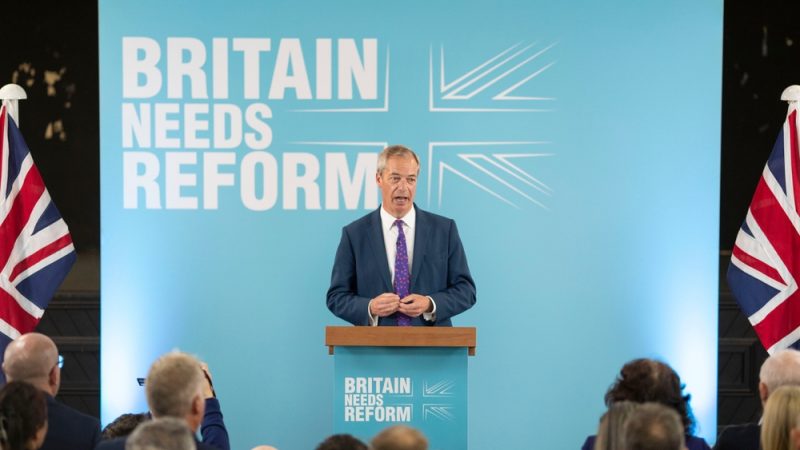AI:
UK Unions warn artificial intelligence risks ‘surveillance and discrimination’

Two large Labour-affiliated trade unions have warned about the impact of artificial intelligence on workers, hours after Keir Starmer pledged to make the UK a “great AI superpower”.
The Prime Minister said in a speech today that AI meant changes in jobs rather than lost jobs, but the unions, which are both major financial backers of the party, said that workers must have a say in how the new technology is implemented.
Unite general secretary Sharon Graham said her union’s members had already experienced major changes to their working conditions, leaving some feeling “alienated and demotivated”.
“We also have serious concerns about matters such as AI-powered surveillance and discrimination by algorithm, particularly with ‘high-risk’ decisions like recruitment, performance assessments and discipline,” she said.
“After years of fighting against discrimination, there is now the genuine threat of it being further embedded through AI, against women, Black and Asian ethnic minority, disabled and LGBTQ+ workers.
“The introduction of AI in the workplace must be something that happens with workers and not to workers. Government, employers, and unions all need to be working together to avoid the potential dangers of workplace AI.”
Unison warning over algorithm decisions made ‘on the sly’
Meanwhile UNISON said the new technology must be managed “carefully and responsibly”.
“That means proper input from workers and all parts of society to ensure it’s not only the voice of big tech being heard,” UNISON policy officer Kate Jones said.
“UK workers have vast expertise and insight that can help shape AI development in ways to benefit everyone. The technology must be used to enhance jobs and services, not cut corners, costs and human input.
READ MORE: ‘AI is the future of campaigning. Labour must embrace this emerging technology’
“History shows that when workers have a real say in how new technologies are developed and used, society is all the better for it.
“AI in the public sector has huge implications, from data privacy to bias and discrimination. The public needs to know their concerns are being addressed.
“No one wants their details being misused by tech giants or biased algorithms making decisions about their welfare on the sly.”
It comes after the Prime Minister said AI was the “defining opportunity” of our generation as he outlined the government’s AI plans, which include the creation of several AI growth zones and the building of a new supercomputer.
PM: ‘It’s about changed jobs, not lost jobs’
Asked by the BBC about AI taking worker’s jobs, he said: “I think we have to look at this through the lense of opportunity. So when it comes to jobs, the question isn’t the loss of jobs, it’s the change in jobs.
“To take an example, for a doctor who spends less time on the notes, that doctor can spend more time on the patient.
“It will change jobs, but it will change them for the better, same for teachers with the preparation of lessons. And that will be the story behind this, (AI will) change jobs so that we can get on with more of the human element to some extent.”
Among the criticisms following the Prime Minister’s speech, there was also cautious optimism from the Institute for Public Policy Research.
‘Whether we like it or not, AI will change everything’
Carsten Jung, head of AI at IPPR, said AI has the power to either disrupt the economy or transform it for the better.
“Our previous research found that AI could either lead to eight million job losses and no GDP gains, or no job losses and GDP gains worth up to £306bn a year,.”” he said.
“The government has today made it clear that it’s understood this potential and the need to steer AI towards a positive scenario.
“The government has fired the starting gun on giving AI deployment more strategic direction. Next to productivity, AI should also help solve big social challenges such as poor health and the energy transition. Rather than a scattergun approach, AI should be laser focussed on delivering the government’s missions. This will require big changes to the way tech policy is run.”
READ MORE: Labour must resist Tory deregulation of AI and set out an alternative vision
“Today’s announcement to invest big in public and private AI infrastructure will be crucial to achieve this. Running public AI on public computers will also be key to ensure citizens’ trust in the technology. Similarly, investing in our regulators so they’re equipped to regulate AI properly will need to go hand in hand with this.”
Writing for LabourList ahead of the speech, Ryan Wain, political director at the Tony Blair Institute, warned that if progressives don’t harness the power of AI, the populist right will.
“Whether we like it or not, AI will change everything,” he said. “It should be the progressive mission to harness it for our people by putting it at the heart of a new mode of government.”
Artificial intelligence: ‘If progressives don’t harness AI, the populist right will’

Is Reform taking on Labour or the Tories? Commentators who have been fiercely speculating on this question will hear the answer when Nigel Farage takes to the stage at Reform’s latest regional conference today. The setting – a hotel in Chester – is deliberate, bedding down in Labour’s north-western heartlands. However, Farage’s focus is more fundamental. He will position Reform as the disruptors in British politics, challenging the status quo. Labour must do the same or risk becoming accidental defenders of it.
The narrative that Reform is in a straight fight with Labour makes sense on the surface, but a narrow interpretation risks the wrong response. Yes, majorities have been slashed. The average Labour MP in a safe seat in the North West holds a smaller majority over their nearest opponent compared to 2019. Reform is second to Labour in 89 seats, with many of these in the North West. Meanwhile, the Tories have shifted from being the chased to the chasers, moving further rightwards in search of voters who deserted them in 2024. However, this is ultimately a futile exercise. They will not out-Reform Reform.
‘Key to the success of the government is not drifting into defending the status quo’
The Prime Minister has rightly resisted taking Labour down this path. His calm and measured response to the populist right’s denigration of him and his ministers showed a strength needed in 21st-century politics. This must be coupled with radical policymaking that addresses the fundamental challenges facing the country. Key to the success of this government – and progressives worldwide – is that they don’t drift into becoming accidental defenders of the status quo.
After all, the status quo is failing Britain. The country is stuck in a doom loop of low productivity, low growth, low investment, and high taxation. Healthcare spending consumes 43 percent of day-to-day government departmental budgets, and this is only set to grow as people live longer but not necessarily healthier lives. An increasingly insecure world rightly demands increased investment in military power, but this comes at the cost of reduced investment in our own people.
‘It should be the progressive mission to harness AI’
There must be a fundamental reimagining of the state that the left helped create. It won’t be a big state or an ideologically small state. It will be an enabling state, ready for the age of Artificial Intelligence (AI). Too often seen as just a clever chatbot, AI will bring high-IQ intelligence at speed to humanity’s greatest challenges. It will discover new therapeutics and personalize medicine. It will unearth new elements that will create new materials. It will transform complex networks, such as the national grid, making smart decisions to increase energy efficiency and consumption. It will power driverless cars and combine with robotics to move from concept to practice.
Whether we like it or not, AI will change everything. It should be the progressive mission to harness it for our people by putting it at the heart of a new mode of government. This requires data. An enabling state would ensure that every citizen has control of their data through a digital identity – a digital space where their data combines safely and securely. Imagine a student’s digital learner ID, offering a complete record of academic performance, learning styles, attendance, and attainment.
It could plug into game-changing AI tutors that personalize teaching, recognizing that every student is different and breaking the link between geography and access to quality learning. Meanwhile, a patient’s digital health ID will boost efficiency in the NHS, removing the need to endlessly share personal information at reception desks or in multiple appointments.
Over time, it will secure the much-needed shift to prevention, as AI continually maps a patient’s risk profile and proactively offers treatments to enable people to live healthier, happier lives. Digital ID will personalize public services, but the real magic will happen in the insight it generates across services – for example, understanding the interplay between health and education – allowing the government to make better decisions.
If progressives don’t own this, then the right will – as seen with the fusion of technologists and populists in the US. Reform’s ambition is clear: they want to win everywhere. Their North West conference won’t be about speaking to a particular geography but addressing the palpable sense of disdain with the country – one shared by three quarters of voters. Labour can counter this in government. With a strong majority and time on their side, they must out-reform Reform. This means reimagining what the state is and what it’s capable of.
No comments:
Post a Comment